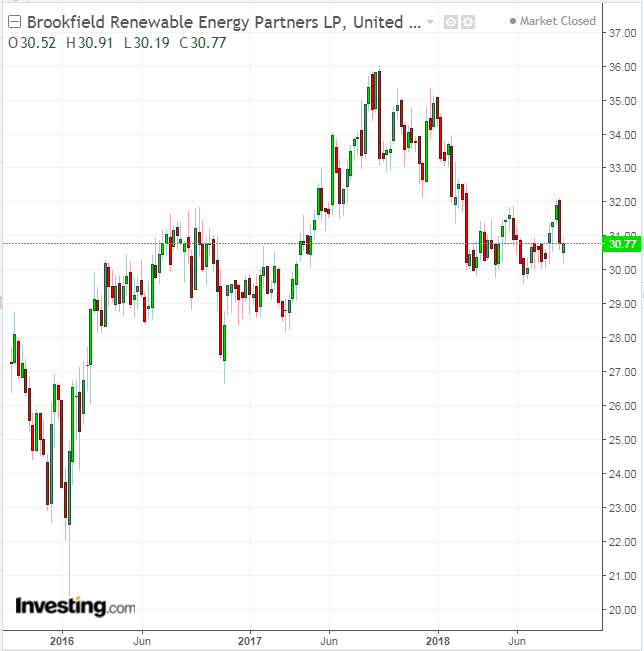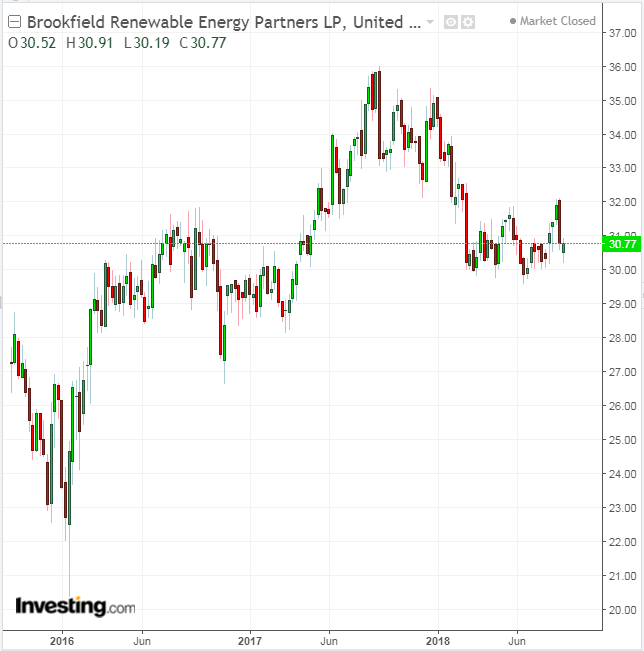Markets are currently facing a broad variety of fundamental dangers. Included on this list are an escalating trade war, ongoing speculative investor behavior and rising inflationary pressures within the US economy. Any or all of these factors could derail this unprecedented equity market bull run.
On Friday, the mega-cap Dow Jones Industrial Average dropped 150 points at one point, when President Donald Trump said the US is ready to slap tariffs on an additional $267 billion worth of Chinese goods. The same day, the yield on the benchmark two-year Treasury note jumped to its highest level in more than 10 years after the economy added more jobs than expected in August. Wages posted their biggest increase of the post-recession period in that month, reminding investors the inflation beast isn’t dead yet and could still raise its ugly head at anytime.
For equity investors these threats are a good reminder that it's prudent to keep some defensive stocks in their portfolios, as a hedge against times of extreme volatility. For this we particularly like utilities. Thanks to the defensive nature of their businesses and their highly regulated revenue, utilities can generate stable cash flow while offering steady dividends.
In fact, utilities that provide power, gas and water to consumers' homes and offices don't just pay dividends, but have, in most cases, regularly increased those payouts for decades. Holding these shares for the long-term is a great way to garner a steady income flow along with above-average yields, even when other areas of the market go through compression.
Here are our two top utility picks worth considering:
1. Brookfield Renewable Energy Partners

Investing in companies that use renewable resources to produce energy is a good way to enter this space. The consumption of renewable energy is expected to grow, as the technology to produce clean sources of power improves and becomes ever cheaper. Among these clean energy producers, we like Bermuda-based Brookfield Renewable Energy Partners (NYSE:BEP) because of its dominant position in the field and its diversified asset base.
Recent statistics bolster the case for BEP. The International Energy Agency sees continued strong growth in renewables through 2022, with renewable electricity capacity forecast to expand by over 920 GW — an increase of 43%.
Solar farms with about four hours of storage capacity will be able to sell power for about $0.035 within a few years, according to Jim Robo, chief executive officer of NextEra Energy (NYSE:NEE), the world’s largest generator of power from wind and sunshine. Wind paired with batteries will be even cheaper, at about $0.025, according to a Bloomberg report.
That shift to renewable energy sources has already started to hurt producers of gas turbines. General Electric (NYSE:GE), one of the largest equipment makers for traditional power producers, has seen revenue from this unit decline drastically.
In contrast, Brookfield's diversity—it operates hydroelectric, wind, solar and biomass facilities among its other renewables operations—and depth, with 17,400 MW of capacity and 876 facilities in North America, South America, Europe, and Asia, give the company a broad array of services. After a 7% pullback in its stock price this year, Brookfield’s dividend yield looks extremely attractive at 7%.
Long-term income investors can take advantage of this opportunity to lock in a hefty yield in a company that is growing and producing strong cash flows. Shares closed last week at $30.77.
2. Enbridge Inc.

Toronto-based Enbridge (NYSE:ENB) is another way to play the utilities space. It's a top energy infrastructure provider in North America.
Enbridge's pipeline network handles 28% of the crude oil produced in North America. The company also moves about 22% of all natural gas consumed in the US, serving key supply basins and demand markets.
Due to this significant role in the region’s energy infrastructure, Enbridge stock is a relatively safe bet for the long-run. The company’s strong cash-generating capability through a regulated rate structure also makes it a dependable stock with which to earn stable income during any recession or market downturn.
In addition, Enbridge has an excellent dividend history. Over the past 20 years, its payout has grown at an average compound annual growth rate of 11.7%. Going forward, Enbridge is expecting 10% growth in the annual dividend through 2020 as it undertakes $22-billion worth of development projects.
Even with its R&D expenditures, the annual dividend yield of close to 6% makes Enbridge stock worth holding as a defensive position with which to earn steadily growing income in any portfolio. The stock closed at $34 per share on Friday.
Bottom Line
Some investors remain skeptical of utility stocks as rising interest rates diminish the investment appeal of these dividend stocks when compared with safe haven assets such as government bonds. Nonetheless, for income investors there's never really a bad time to own utilities, as long as that investment is for the long-term and the stocks you pick are in a growth mode. Companies like Brookfield and Enbridge both fit that bill.
